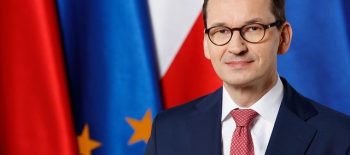By law, every Jew in German-occupied Poland had to be handed over to the German authorities. Breaking this law meant a death sentence for the entire family
On September 10, 2023, a Polish family – a husband, a wife and their seven young children – will be declared blessed. They are Józef and Wiktoria Ulma, who were executed with all their children in March 1944, in the backyard of their home in the Polish village of Markowa, now on the border between Poland and Ukraine. Their only crime was that they had provided shelter for two Jewish families for a year and a half, in violation of German law. In German-occupied Poland, every Jew had to be turned over to the authorities to be killed.
The person who reported the Ulmas family to the German authorities has never been conclusively identified. In any case, gendarmes who arrived in Markowa found two Jewish families in a Polish house and killed them on the spot as outlaws. Then they shot Józef and Wiktoria Ulma, and, according to the witness, pondered for a moment what to do with the pair’s many children. Eventually, they decided it was better to kill them all as well ‘lest the village has a problem with them.’ The main perpetrator – the German lieutenant Eilert Dieken in charge of the execution – was not even a member of the Nazi Party, so after the Second World War he served as an ‘ordinary German’ in the police force of democratic West Germany, and died many years later surrounded by his family and the respect of his German neighbours.
The historical circumstances of that event are often forgotten or misrepresented. In the summer of 1941, after Hitler invaded the Soviet Union, the Germans decided to begin the extermination of Jews, starting with those who had lived in the vast Polish territories for centuries. Mass executions of entire Jewish towns and villages commenced in the country’s eastern borderlands, soon to be followed by the establishment of the first extermination camps at Bełże, Sobibor and Treblinka, located in the then centre of occupied Poland. Soon, however, the occupiers realised that the conquered peoples were beginning to comprehend the full horror of the new German policy, and thanks to the help of Poles, Belarusians and Ukrainians who were citizens of the occupied Polish state, more and more Jews managed to find salvation.
The German authorities then saw that the extermination of all European Jews on Polish territory – as planned in January 1942 at the German government’s infamous Wannsee Conference – could not succeed unless non-Jewish citizens of the occupied country were also terrorised. To this end, German Governor Hans Frank had issued an extreme law already in October 1941, ordering the death penalty for anyone who in any way helped the outlawed Jews. But even this degree of repression proved insufficient, and in 1942 the penalty was extended to anyone who failed even to report to the authorities a known instance of aiding a Jew.
I don’t think anyone else has ever passed a law imposing death sentences for the most basic act of human kindness: offering bread or shelter. Even the Germans themselves did not enforce such laws anywhere other than on Polish territories. But occupied Poland still had Home Army, fighting the Germans, and underground authorities in hiding. They appealed to the population not to give in to German orders, despite the extreme terror aimed at imprisoning the Jews and forcing all citizens to participate in this genocidal campaign. The underground Polish authorities even created a special institution, called the Council for Aid to the Jews, which enabled thousands of Jews to obtain housing, false documents and the money necessary to survive.
An insightful researcher of these pages of history, Professor Grzegorz Berendt from Gdańsk, sadly states that in the face of the laws enacted by the Germans, only ‘relatively few’ people decided to help the Jews. Berendt estimates their number at several tens of thousands – in a country of more than thirty million inhabitants –mainly Poles but also Ukrainians and Belarusians who had Polish citizenship. Today, ten thousand of these heroes are known by name, mainly through the accounts of the Jews they saved. Seven thousand were honoured with a memorial tree at the Yad Vashem Museum in Jerusalem. Among the Jewish survivors were people like Stella Zylbersztajn, who managed to survive thanks to the help received from almost sixty Poles.
In Christian terms, to declare someone ‘blessed’ is to recognise their holiness. So a Christian can now pray to Józef, Wiktoria and each of their seven children, or turn to God through their spiritual intercession. Their portraits and statues will soon be on the altars of many churches, most likely not only in Poland. And it should be remembered that martyrs are saints of a special kind, even beyond the Christian tradition. The idea that a martyr’s death justifies life, and that a person giving his or her life for another human as a result of the radical practice of love is a hero, a champion, a saint, has been deeply rooted in human civilisation since time immemorial.
It was Socrates (as presented to us by Plato in the Phaedo) who discovered the truth that the willingness to die for the sake of justice is the strongest and ultimate proof of the value of our lives. And the Founder of Christianity added to this the teaching that ‘no one has greater love than this, to lay down one’s life for one’s friend.’ As the testimonies collected in the course of the beatification process clearly show, the Ulmas were a fervently Christian family who led an honest, hardworking and devout life. They must have been well aware of the German law that made aiding a Jew an offence punishable by death, especially as the occupying authorities persistently announced it every day, along with lists of Poles who had already been executed for violating this law. And yet, for a year and a half, they knowingly risked death every day in the name of the commandment to love one’s neighbour. Their martyrdom made them bear witness to the righteousness of this precept and led them to immortality.
Jan Rokita
Published in cooperation with the Polish monthly „Wszystko co najważniejsze“ as part of a historical project run jointly with the Institute of National Remembrance and the Polish National Foundation




